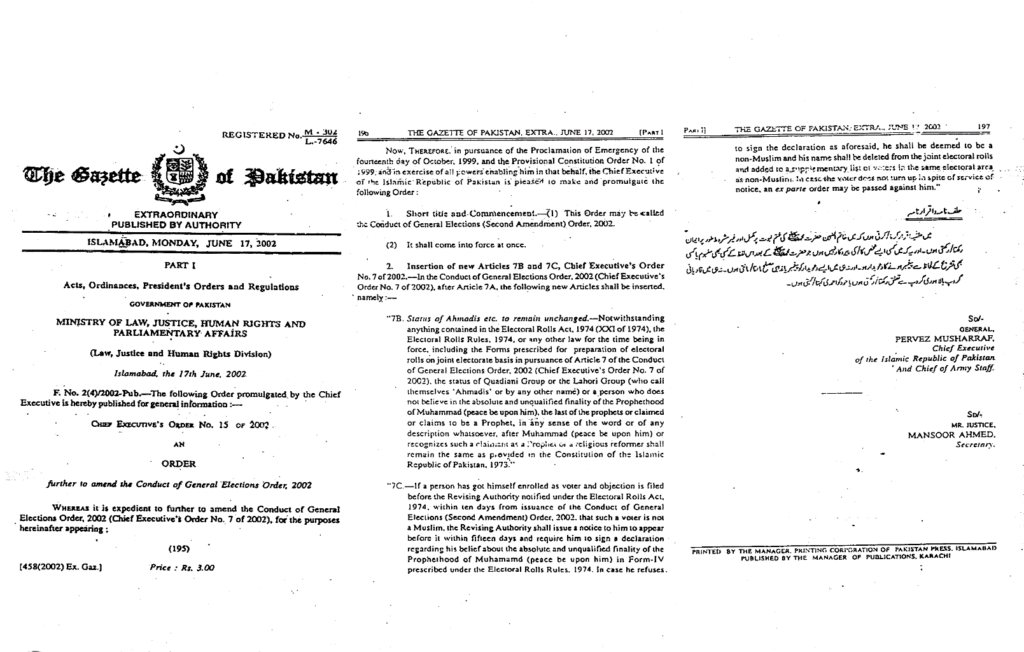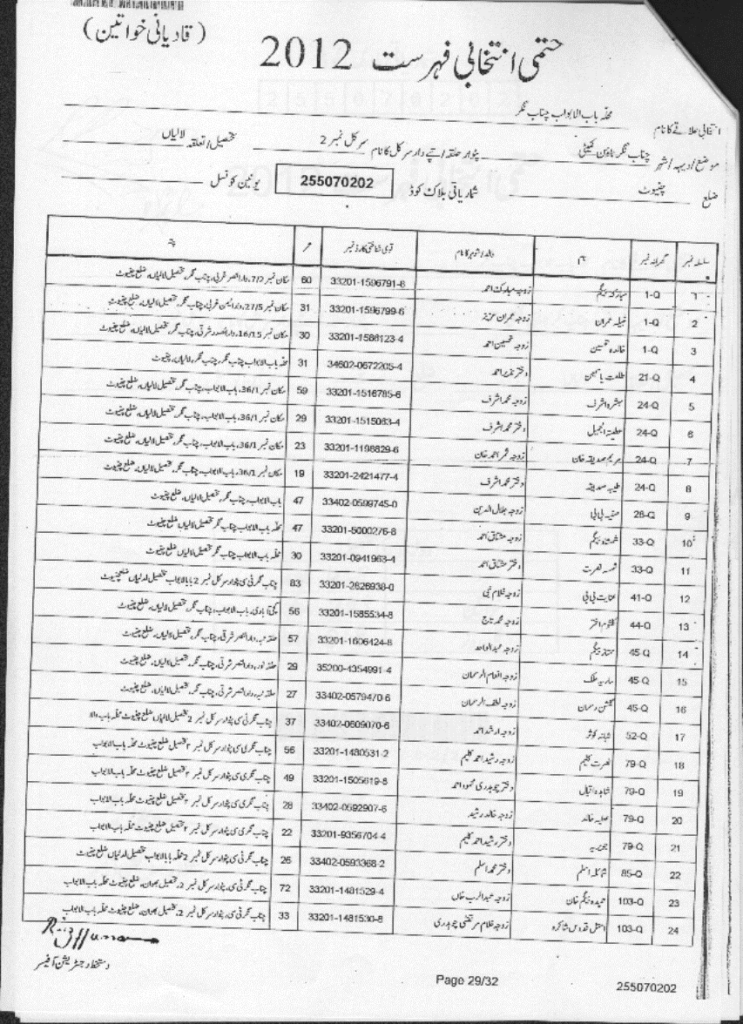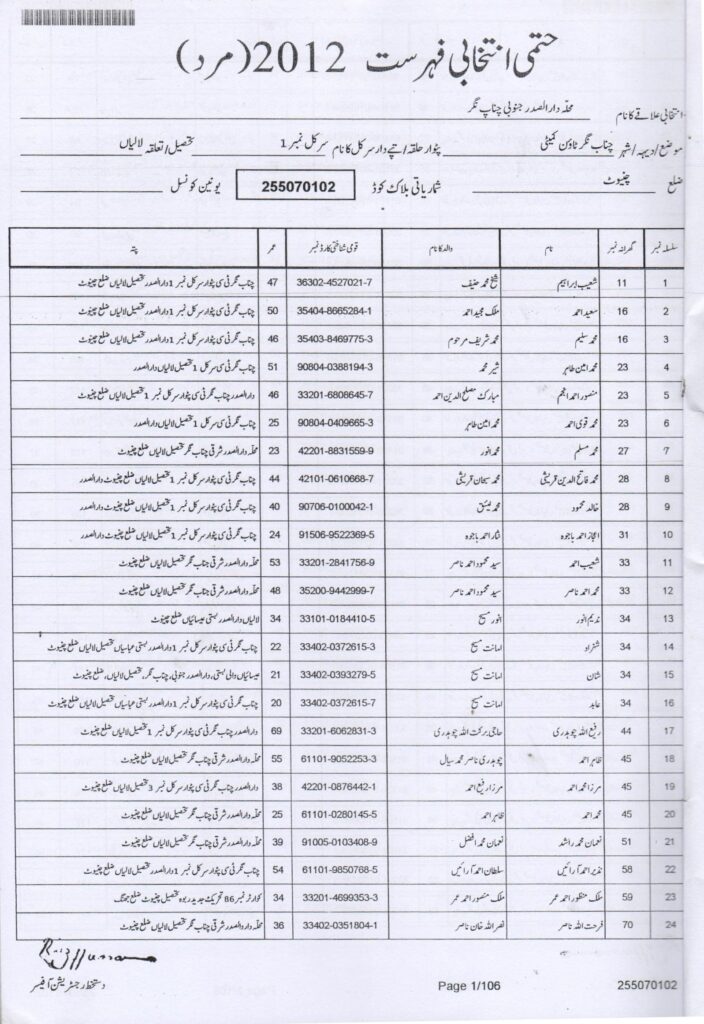VOTING RIGHT is a basic human right in a democracy. Ahmadis are denied this right by devious and discriminatory laws in Pakistan. It is done through unscrupulous rules and corruption of the electoral system.
The right to participate in elections is guaranteed to every citizen of Pakistan under the Constitution of the Islamic Republic of Pakistan and Article 21 of the Universal Declaration of Human Rights to which Pakistan is a signatory. Denial of this right is a gross violation of these sacrosanct provisions.
From the inception of Pakistan in 1947 till the time of Former President General Zia-ul-Haq, all the national elections to the Provincial and national assemblies were conducted on the basis of a joint electorate system. The Ahmadiyya Community (the “Community”) participated in all elections like the rest of the population.
Former Prime Minister, Zulfiqar Ali Bhutto (1971–1977) through an amendment allocated a few additional seats to religious minorities in Assemblies contrary to the original allocation of seats for minorities in Pakistan. As Ahmadis refused to accept the imposed status of not-Muslim minority handed down to them through Constitutional Amendment No. II, the Community did not avail of the said seats.
Former President General Zia-ul-Haq introduced a Separate Electorate for a party-less election in 1985 imposed through the 8th Constitutional Amendment in the Constitution of Pakistan (the “Constitution”). Since then, separate electoral lists were prepared on the basis of religion. A Muslim voter must sign a declaration of ‘the finality of Prophethood’.
In May 2002, the system of Joint Electorate was reintroduced through the Conduct of General Elections (Second Amendment) Order, 2002, which attracted backlash, mainly from the religious clerics. As a result of the backlash, General (r) Musharraf, issued a Chief Executive’s Order No. 15 dated June 17, 2002, titled Conduct of General Elections (Second Amendment) Order, 2002 which created a separate ‘supplementary list of voters’ in which Ahmadi voters were placed as ‘non-Muslim’. It also provided a procedure in Article 7C whereby Muslim voters were required to sign a declaration concerning belief about the absolute and unqualified finality of the Prophethood of Holy Prophet Muhammad (peace be upon him) and those who refuse to sign the certificate were to be deleted from the joint electoral rolls and added to a supplementary list of voters in the same electoral area as non-Muslims(sic).
Subsequent to the 2013 General Elections’, A parliamentary committee undertook some revision of the main Electorate Rolls Act, 1974 and thus On October 2, 2017, the parliament passed the Election Act 2017 (the “Act”). According to the new law, Ahmadis could vote as they were no longer required to fill in application forms to register as voters and were to be placed on joint lists prepared by NADRA.
The Act also required every candidate who claims to be Muslim to make a declaration of belief on oath. For ease, it is reproduced below.
“I believe in the absolute and unqualified finality of the Prophethood of Muhammad (peace be upon him), the last of the prophets and that I am not the follower of anyone who claims to be a prophet in any sense of the word or of any description whatsoever after Prophet Muhammad (peace be upon him) and that I do not recognize such a claimant to be a prophet or a religious reformer, nor do I belong to the Qadiani group or the Lahori group, or call myself an Ahmadi.”
The discriminatory provisions contained as Articles 7B and 7C of the Conduct of General Elections Order, 2002 (Chief Executive’s Order No.7 of 2002) (as amended by C.E. Order No. 15) were also made a part of the Election Act 2017 through Election (Amendment) Act, 2017 whereby Ahmadis were again added to a supplementary list of voters. [Copy of the Chief Executive Order No: 15 of 2002 is attached as Annexure A respectively].
During the General Elections of 2013 & 2018, the Election Commission of Pakistan issued a separate list of Ahmadi voters along with their addresses. Members of the Community had serious reservations with this development as it placed its’ members vulnerable to faith-based attacks. For every future election, the Election Commission will update this list. This is a cause of serious concern for the Community. [Copies of Excerpts of a separate list of Ahmadi voters along with their addresses is attached as Annexure B respectively].
Conclusion
The Ahmadiyya Community was forced to boycott General Elections held in 1985, 1988, 1990, 1993, 1997, 2002, 2008, 2013 and 2018. Ahmadis cannot participate in the face of these special conditions applicable to them.
The government should take steps to effectively restore the right to vote for Ahmadis. The government should ensure that not only election rules do not hinder Ahmadis’ participation in elections at all levels, as candidates as well as voters, but it should also revise the rules to make these simple and candid to facilitate Ahmadis’ participation in a genuine Joint Electorate that should bear no reference to religion whatsoever. The issue of extra seats for the minorities should be handled separately and separate forms and procedures should be introduced to support these; Ahmadis will not avail these seats.
Annexure A: Anti-Ahmadi Articles, 7B and 7C are now a part of the Election Act 2017 Introduced through the Election (Amendment) Act, 2017

Annexure B: Copies of Excerpts of a separate list of Ahmadi voters along with their addresses

